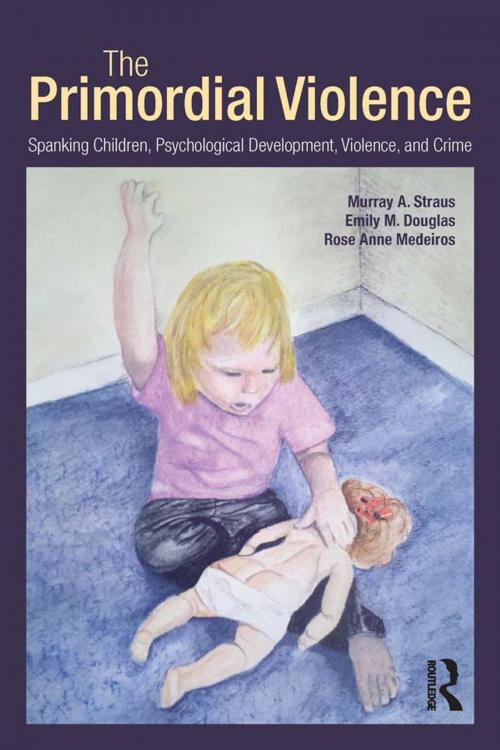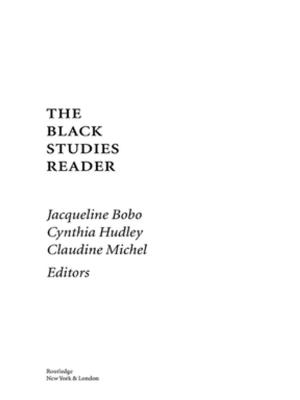The Primordial Violence
Spanking Children, Psychological Development, Violence, and Crime
Nonfiction, Social & Cultural Studies, Social Science, Social Work, Health & Well Being, Psychology, Child & Adolescent, Child Development, Family & Relationships, Parenting| Author: | Murray A. Straus, Emily M. Douglas, Rose Anne Medeiros | ISBN: | 9781136671432 |
| Publisher: | Taylor and Francis | Publication: | September 11, 2013 |
| Imprint: | Routledge | Language: | English |
| Author: | Murray A. Straus, Emily M. Douglas, Rose Anne Medeiros |
| ISBN: | 9781136671432 |
| Publisher: | Taylor and Francis |
| Publication: | September 11, 2013 |
| Imprint: | Routledge |
| Language: | English |
A CHOICE Outstanding Academic Title 2014!
Why do parents hit those they love? What effect does it have on children? What can be done to end this pattern? These are some of the questions explored in The Primordial Violence. Featuring longitudinal data from over 7,000 U.S. families as well as results from a 32 nation study, the book presents the latest research on the extent to which spanking is used in different cultures and the subsequent effects of its use on children and on society. Evidence that shows the relationship between spanking and the subsequent slowing of cognitive development and increase in antisocial and criminal behavior is shown. Both cross-sectional and longitudinal studies are explored in an accessible fashion. An abundance of high quality research has produced findings that are highly consistent from study to study which show that spanking is a risk factor for aggressive behavior and other social and psychological problems. Because of these findings, the authors argue for policy changes and recommend a drastic reduction in the use of spanking. Policy and practical implications are explored in most chapters.
The Primordial Violence highlights:
The benefits of avoiding spanking such as the development of better interpersonal skills and higher academic achievement;
The link between spanking and behavioral problems and crime;
The extent to which spanking is declining and why despite the unusually high level of agreement between numerous studies which found harmful effects from spanking, most parents continue to spank.
Part 1 documents the worldwide use of spanking and why parents spank. The possible adverse effects of spanking on children’s behavior and academic achievement, and the potential for violence and criminal behavior in later life, are explored in Parts 2, 3, and 4. Part 5 examines trends in spanking, and suggests what can be done to lower the percent of parents who spank. Contradictory opinions about whether to spank are explored. The book concludes with a call for change in this aspect of parenting which will have profound benefits, for the children and families involved, and society as a whole.
Intended for a general audience of readers who are interested in child development and parenting and for advanced undergraduate and/or graduate courses in child abuse, family violence, juvenile delinquency, criminal behavior, social development, sociology of the family, or parenting and family relations taught in psychology, human development, family studies, criminology, education, social work, sociology, and social policy.
A CHOICE Outstanding Academic Title 2014!
Why do parents hit those they love? What effect does it have on children? What can be done to end this pattern? These are some of the questions explored in The Primordial Violence. Featuring longitudinal data from over 7,000 U.S. families as well as results from a 32 nation study, the book presents the latest research on the extent to which spanking is used in different cultures and the subsequent effects of its use on children and on society. Evidence that shows the relationship between spanking and the subsequent slowing of cognitive development and increase in antisocial and criminal behavior is shown. Both cross-sectional and longitudinal studies are explored in an accessible fashion. An abundance of high quality research has produced findings that are highly consistent from study to study which show that spanking is a risk factor for aggressive behavior and other social and psychological problems. Because of these findings, the authors argue for policy changes and recommend a drastic reduction in the use of spanking. Policy and practical implications are explored in most chapters.
The Primordial Violence highlights:
The benefits of avoiding spanking such as the development of better interpersonal skills and higher academic achievement;
The link between spanking and behavioral problems and crime;
The extent to which spanking is declining and why despite the unusually high level of agreement between numerous studies which found harmful effects from spanking, most parents continue to spank.
Part 1 documents the worldwide use of spanking and why parents spank. The possible adverse effects of spanking on children’s behavior and academic achievement, and the potential for violence and criminal behavior in later life, are explored in Parts 2, 3, and 4. Part 5 examines trends in spanking, and suggests what can be done to lower the percent of parents who spank. Contradictory opinions about whether to spank are explored. The book concludes with a call for change in this aspect of parenting which will have profound benefits, for the children and families involved, and society as a whole.
Intended for a general audience of readers who are interested in child development and parenting and for advanced undergraduate and/or graduate courses in child abuse, family violence, juvenile delinquency, criminal behavior, social development, sociology of the family, or parenting and family relations taught in psychology, human development, family studies, criminology, education, social work, sociology, and social policy.















